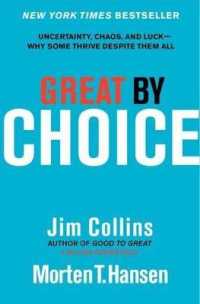Full Description
Discussion is distorting today. Within schools, social movements, and firms, there has been an increasing tendency for teachers and facilitators to announce that there will be a discussion while the interaction which follows this announcement is not a discussion, but something else, likely a recitation and lecture. This distortion of discussion promises democracy, equality, and participation during a meeting or class, but delivers inequality, prohibition, and dominance.
Now is the time to begin changing these practices which ultimately create and support a neoliberal society that promises democracy but practices oligarchy. One way to change this neoliberal social world is by intervening in the distortion of discussion, by facilitating interaction so that discussion's promise of equality and participation is fulfilled rather than negated. Elements of Discussion is a resource for this intervention. It is a political, poetic, and practical handbook for facilitating discussion. Discussions happen everywhere, and if society itself is composed of relationships between people then creating more participation and equality during discussions can help create the conditions for social change. Elements of Discussion therefore includes practical tips, techniques, and reflective questions through which it firmly and sensitively suggests to readers how to facilitate discussions across contexts. Beginning with the ways chairs and tables are set up, continuing through the kinds of questions a facilitator can ask, and including sample activities facilitators can use, the book expounds a philosophy of facilitating discussion, emphasizing the political and poetic significance of the tactics it recommends.
Contents
Preface.
Chapter 1. Chairs.
Chapter 2. Tables.
Chapter 3. How Did You Get To This Discussion?
Chapter 4. What Discussion Is and Is Not: Recitation.
Chapter 5. Be Early.
Chapter 6. "Hi".
Chapter 7. Here We Are.
Chapter 8. Check-in.
Chapter 9. Bodies.
Chapter 10. Written and Oral Discussion.
Chapter 11. Online Discussion.
Chapter 12. Physical Activity.
Chapter 13. The Living Silence.
Chapter 14. Questions.
Chapter 15. Collective Questioning.
Chapter 16. The First Silence.
Chapter 17. The Second Silence.
Chapter 18. Your Eyes.
Chapter 19. The General Rule of Silences.
Chapter 20. Notes.
Chapter 21. Make Your Voice A Mixtape.
Chapter 22. Freedom.
Chapter 23. The White Man.
Chapter 24. Different Kinds of Quiet People.
Chapter 25. Discussion and Deliberation.
Chapter 26. Mmmmmm.
Chapter 27. Repair.
Chapter 28. Be Unsure.
Chapter 29. Facilitator/Participant.
Chapter 30. One Person Is A Universe.
Chapter 31. Openness.
Chapter 32. Discussion Over Time.
Chapter 33. A Good Rule.
Chapter 34. Proper Names.
Chapter 35. "I Learned A Lot From What You Said".
Chapter 36. Food.
Chapter 37. Equality.
Chapter 38. Language.
Chapter 39. Talking Sticks and Bells.
Chapter 40. Turn vs. Comment.
Chapter 41. The Average Game.
Chapter 42. Counting.
Chapter 43. Making Decisions.
Chapter 44. Discussion as Democracy.
Chapter 45. What Discussion Is and Is Not: Dialogue.
Chapter 46. What Discussion Is and Is Not: Socratic.
Chapter 47. Discussion and Conversation.
Chapter 48. "Sharing Ideas".
Chapter 49. Be Aware of the Time.
Chapter 50. Get Exuberant Once or Twice.
Chapter 51. Pause.
Chapter 52. Knowing the Stakes.
Chapter 53. Therapy.
Chapter 54. When Things Boil.
Chapter 55. Sexism.
Chapter 56. Facilitator Power.
Chapter 57. English.
Chapter 58. Discipline.
Chapter 59. Other Theories.
Chapter 60. Fairy Tale Tennis Ball.
Chapter 61. Remembering Game.
Chapter 62. Emotional Social Contract.
Chapter 63. Tangents.
Chapter 64. Comment Game.
Chapter 65. Debrief.
Chapter 66. Discussing Discussion.
Reading List.
Author Bio.







